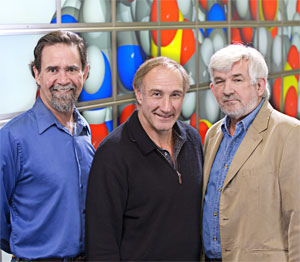Licensed to Succeed
March 27, 2006 -- CODA Genomics is a “virtual incubator” technology-transfer success story. The company is rooted in research that occurred in the UCI labs of Professors G. Wesley Hatfield and Rick Lathrop, who developed a method for making synthetic genes that express proteins in heterologous hosts.
|
Other UCI researchers inundated Hatfield and Lathrop with requests to manufacture specific genes for their own research. “We started making genes, but it was fairly clear that we couldn’t continue without obtaining additional funding,” says Hatfield. The Institute for Genomics and Bioinformatics, under whose auspices Lathrop and Hatfield were conducting their research, contributed seed funding, as did the vice chancellor of research, and deans from the schools of biological sciences, medicine, information and computer sciences, and physical sciences. The $200,000 contribution allowed the researchers to establish the Computational Biology Research Laboratory, where they began manufacturing the requested genes while continuing their research into improved methods for synthetic gene production.
Success in the lab and customer feedback soon led to thoughts of a spin-off company.
Fledgling Startup Takes Flight
UCI’s Office of Technology Alliances patented the technology and licensed it to a startup company formed by Hatfield and Lathrop, and CODA (Computationally Optimized DNA Assembly) Genomics Inc. was born. Bob Molinari, a prominent Bay-area biotechnology executive, came on board as CEO in the summer of 2004.
“After years of looking at biotech markets, this was the first time I had seen computational rigor applied to a problem that simplified the way biology research was done,” Molinari says. “For the first time, I saw computation, which could be done in hours, replace months of wet biology and succeed in getting proteins to express reliably.”
The fledgling company raised $180,000 from friends and family before raising $800,000 in a first round of funding from the Tech Coast Angels, an early-stage technology-and-life-science funding group. That was followed by a second, recently closed outside round that raised more than $600,000 led by Life Science Angels, a San Francisco-based funding group.
Initially, CODA Genomics operated as a “virtual” company ─ it was incorporated as a California corporation, but it possessed few physical assets, such as facilities, equipment or research staff. Rather, it operated under sponsored research agreements, and sales and service agreements with UCI that were implemented by OTA. These agreements, which included overhead, gave the company access to the UCI facilities, equipment and instrumentation it needed.
The company, which licensed the gene engineering tools developed in the CBRL, has completed more than 100 projects for customers, according to Joseph Kittle, Jr., senior vice president of market development. With 2,000-5,000 potential customers worldwide and a 75 percent prospect-to-customer conversion rate, Kittle is optimistic about CODA’s future. “Our marketing is driven by our customers’ unmet need for predictable expression of proteins from genes they have identified,” he says. “Now we can also go beyond the task of getting the protein made and offer new means of tweaking a protein’s structure and activity, all without changing its amino acid sequence.”
Home Sweet Home
CODA’s founders, scientific and management staff, and investors see a bright future ahead. “They’re all successful people who have done this kind of thing before,” says Hatfield. “They agreed to join us not just for the financial reward but because they see a lot of important potential in the company and they’re excited to be involved.”
CODA Genomics Inc. recently outgrew its home in the CBRL and is moving to new headquarters in Laguna Hills this month. The move will take the company out of its virtual status – and that’s a big step.
“The ‘virtual’ situation is a step on the way to technology commercialization that allows a company to get itself established, raise funds, acquire IP rights, carry out research and development activities, and apply for grants at the lowest possible cost at a time when there is not much cash to go around,” explains Dave Schetter, head of OTA. “CODA has proven to be a successful ‘virtual’ company because it was able to become non-virtual.”
That’s important to Molinari, too. “The company’s success is significant to the many customers who are now using its products to solve critical problems in protein-based research and drug discovery,” he summarizes.

